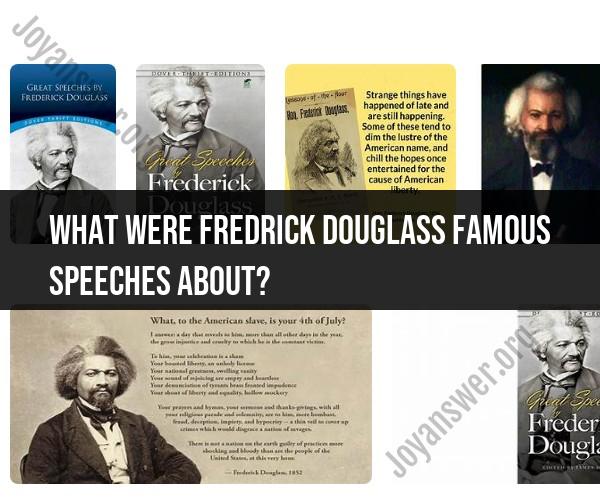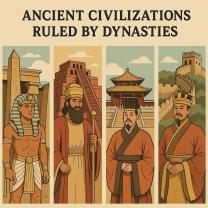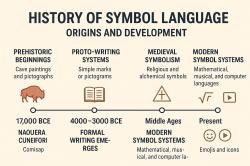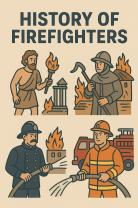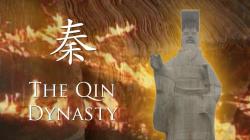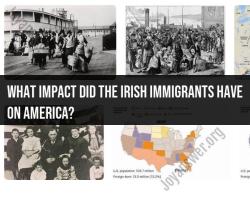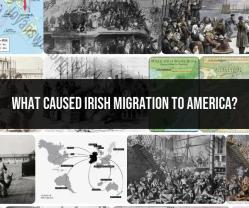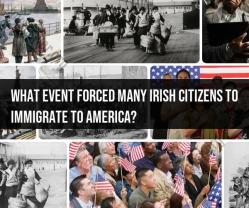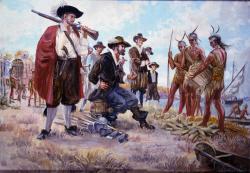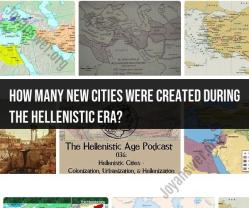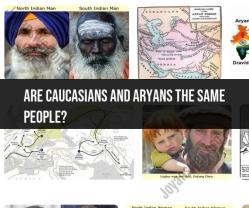What were Fredrick Douglass famous speeches about?
Frederick Douglass, a prominent African American abolitionist and social reformer in the 19th century, delivered several famous speeches addressing various aspects of the abolitionist movement, the fight against slavery, and the struggle for civil rights. Some of his most renowned speeches include:
"The Meaning of July Fourth for the Negro" (1852):
- In this powerful speech delivered on July 5, 1852, Douglass, who had escaped slavery and become an eloquent advocate for freedom, challenged the celebration of Independence Day in the United States. He pointed out the hypocrisy of celebrating freedom while millions of African Americans remained enslaved, emphasizing the stark contrast between the ideals of liberty and the harsh reality of slavery.
"What to the Slave Is the Fourth of July?" (1852):
- This speech, often referred to by its alternative title, echoed the sentiments of "The Meaning of July Fourth for the Negro." Douglass delivered it on July 5, 1852, in Rochester, New York, to a predominantly white audience. He questioned the meaning of the Fourth of July to enslaved people and called for the abolition of slavery and the recognition of African Americans' rights as equal citizens.
"The Hypocrisy of American Slavery" (1852):
- In this address, Douglass denounced the institution of slavery as a glaring hypocrisy within a nation founded on principles of liberty and equality. He critiqued the moral and ethical contradictions of a society that allowed slavery to persist.
"Self-Made Men" (1859):
- While not solely focused on slavery, this speech emphasized the importance of individual agency, self-determination, and hard work in achieving success. Douglass discussed his own journey from slavery to becoming a respected orator and writer, illustrating the potential for self-improvement.
"West India Emancipation" (1857):
- In this speech, Douglass celebrated the emancipation of enslaved individuals in the British West Indies on August 1, 1834. He drew parallels between the struggles for freedom in the West Indies and the ongoing struggle for emancipation in the United States.
"The Composite Nation" (1869):
- After the Civil War and the end of slavery, Douglass continued to advocate for civil rights and equality. In this speech, he discussed the concept of a "composite nation," one that embraces diversity and promotes the full inclusion of all its citizens, regardless of race or background.
Frederick Douglass's speeches were not only eloquent expressions of the injustice of slavery and the importance of freedom but also calls to action, urging Americans to live up to the principles of equality and justice upon which the nation was founded. His words continue to resonate as important contributions to the history of civil rights and social justice in the United States.
Frederick Douglass was a leading abolitionist and orator in the 19th century. His speeches were powerful and persuasive, and they helped to galvanize the anti-slavery movement.
Notable speeches and themes
Some of Frederick Douglass's most notable speeches include:
- "What to the Slave Is the Fourth of July?" (1852): In this speech, Douglass criticizes the hypocrisy of celebrating American independence while millions of people are still enslaved. He asks, "What, to the American slave, is your Fourth of July? I answer: a day that reveals to him, more than all other days in the year, the gross injustice and cruelty to which he is the constant victim."
- "An Appeal to Conscience and Religion" (1845): In this speech, Douglass argues that slavery is a sin and that it is morally wrong to own slaves. He says, "Slavery is a crime against God, and against humanity."
- "The Meaning of July Fourth for the Negro" (1855): In this speech, Douglass argues that the principles of the Declaration of Independence apply to all people, regardless of race. He says, "The Declaration of Independence is a universal document, and applies to all men."
Content and impact
Douglass's speeches were notable for their eloquence, their passion, and their moral clarity. He was able to articulate the injustice of slavery in a way that resonated with his audiences. He also used his speeches to educate people about the realities of slavery and to call for its immediate abolition.
Douglass's speeches had a significant impact on the anti-slavery movement. They helped to raise awareness of the evils of slavery and to inspire people to join the fight for abolition. Douglass's speeches also helped to shape the public debate about slavery and contributed to its eventual demise.
Key messages
Some of the key messages in Frederick Douglass's speeches include:
- Slavery is a moral evil.
- Slavery is a crime against humanity.
- The principles of the Declaration of Independence apply to all people, regardless of race.
- Slavery is incompatible with democracy.
- Slavery must be abolished immediately.
Douglass's speeches are still relevant today. They remind us of the importance of fighting for justice and equality for all people.
In addition to the above, Douglass's speeches also explore other themes such as:
- The importance of education
- The power of words
- The resilience of the human spirit
Douglass's speeches are a powerful testament to his courage, his eloquence, and his commitment to justice. They continue to inspire people around the world to fight for a better future.
